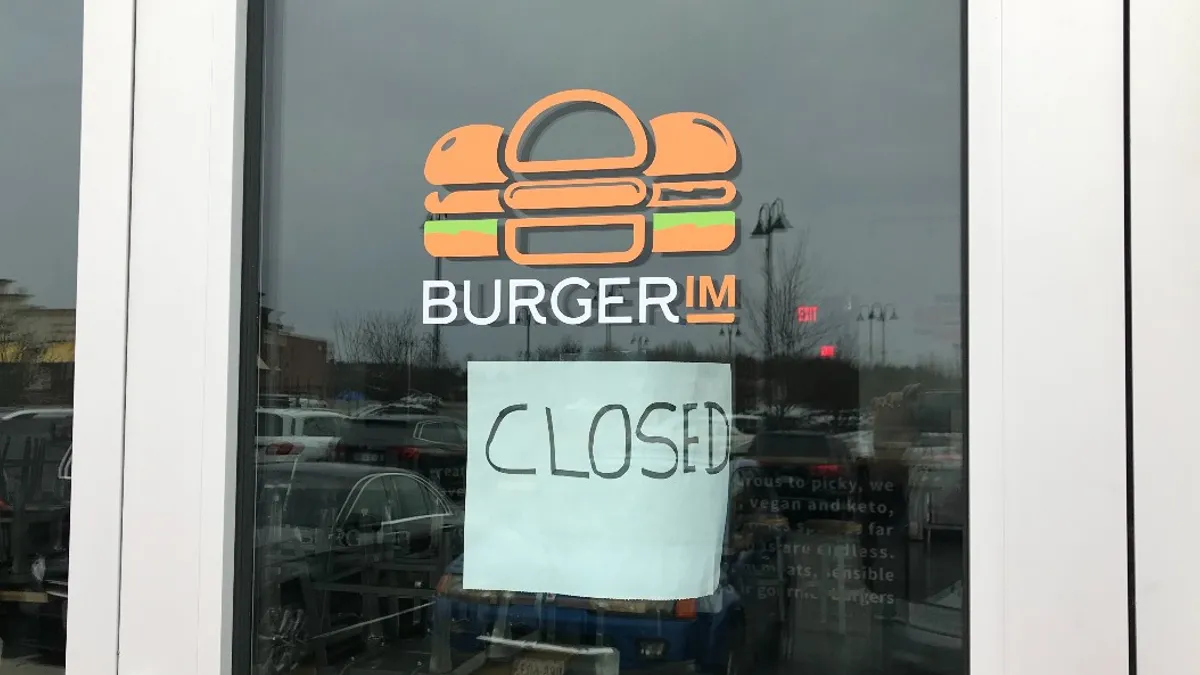Dive Brief:
- Washington is the latest state to revoke Burgerim's right to sell franchising registrations. This news, reported by Restaurant Business, comes just over a month after rumors started that Burgerim could file for bankruptcy. The chain has already had its franchise registration revoked in Maryland, while its franchise registration has expired in Virginia and Michigan.
- Yelp added alerts to Burgerim's review sites after it obtained a letter from Burgerim to social media influencers offering them a free meal for five-star Yelp reviews and other social media mentions.
- Earlier this month, U.S. Senator Dianne Feinstein asked the Federal Trade Commission to investigate the chain over allegations about deceptive practices.
Dive Insight:
Once billed by Restaurant Business as "one of the hottest, fastest-growing brands," Burgerim turned into a "wreckage of unpaid workers, bankrupt franchisees and others struggling to make it work," according to the publication. While the chain's downfall is unprecedented, other franchisors have struggled with franchisee discontent. Quiznos is the poster child of a collapse born out of franchisee issues. The sandwich chain was accused of buying commodities directly from vendors and then marking up the prices to its franchisees. The frozen yogurt sector’s rise and fall can also be blamed, in part, on over-ambitious growth promises to eager franchisees.
For Burgerim, the story is different and, to most, fraudulent. Restaurant Business reports that 19 states have some type of franchise regulation in place, but those regulations do not typically include penalties for fraud. With the exception of publicly traded franchisors beholden to a stringent reporting structure, the same is true at the federal level. Robert Purvin, CEO of the American Association of Franchisees told the publication there are "virtually no protections from scam artists in franchising."
Such a loophole illustrates why Burgerim was able to sell all those licenses despite not having to disclose profit or sales information via a franchise disclosure document. It is also why smaller franchise companies are riskier to get into.
In addition to the lack of stringent regulation, another franchisee pointed the blame at the Small Business Association for guaranteeing loans but not protection after those loans are issued. It is estimated that one in five SBA-backed loans to franchisees fail. But any such protection here could walk a fine line between capitalistic freedom and too much oversight. How much responsibility falls on a franchisee for not reading the red flags when Burgerim didn't collect royalties, or advertised abundantly on social media sites?
With Burgerim specifically, perhaps the biggest red flag came with the unusually low barrier to entry for franchisees, including Facebook and Instagram ads that read: "No Experience Necessary." Further, prospective franchises had no requirement for liquidity, just $50,000 to open a restaurant. For context, Subway requires $80,000 net worth from its franchisees, while Wendy's requires $5 million.
This could easily explain why Burgerim had 1,200 franchise agreements signed at the end of 2019, after just four years in the U.S. market.
Bankruptcy may be the only solution here, but that indicates confidence that the company could be saved. Some franchisees have already taken it upon themselves to rebrand and, reputationally speaking, Burgerim may have a hard time making any kind of comeback despite a concerted restructuring strategy.
Still, a group of Burgerim franchisees has banded together to find a path forward. Though it is small, the power of a united franchisee front has yielded increased leverage at other brands, including McDonald's. The goal of the Burgerim group at this point is simple: to preserve franchisees' investments. That's a big ask. There are an estimated $30 million to $40 million in liabilities at the brand, including as many as 90 lawsuits.










